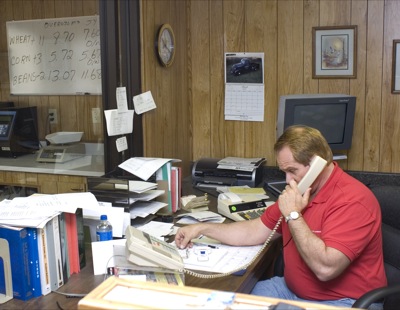Saturday, April 12th, 2008
Elevators squeezed by credit crunch, high costs, market prices
Farmers unable to lock in high market prices any further out than current crop year
By Nancy Allen

Photo by Mark Pummell/The Daily Standard
Vern Schroyer of Mercer Landmark works at his desk Friday at the Mercer Landmark branch on Market Street in Celina. Local elevators, which buy grain from farmers, are being squeezed by the ongoing credit crunch, high costs and high market prices.
Rising grain prices, increasing costs and the ongoing credit crunch are forcing elevators to shorten the amount of time they allow farmers to cash in on current high market prices.
In a normal year, farmers could enter into forward contracts with elevators to lock in a price for their grain for the next two to three years. That practice has changed with the current economic and market conditions.
"We used to forward contract out at least one, maybe two crop years so they could contract in multiple years," said Randy Broady, grain origination manager at Advanced Agri-Solutions Co-op, which has facilities in Mercer, Auglaize and surrounding counties. "Now we are reduced to contracting out to the current crop year, through January of 2009."
Broady said the big elevators such as ADM, Cargill and Bunge have shortened their contracts even more, some down to 60 days.
"We feel as a co-op, farmers should have the ability to lock grain (prices) in the current crop year," he said. "Anything past that we need to look at alternative ways to market grain."
Elevators buy grain from farmers and sell it into the food chain, forming a crucial link between farmers and markets. This also negates the risk farmers would face if they marketed their grain by themselves.
When elevators enter into forward contracts with producers, to offset their risk if prices fall, elevators then typically sell a futures contract on a stock exchange like the Chicago Board of Trade. Whenever the price of the grain goes higher than what is in the futures contract, the elevator has to make what is called a margin call. This means the elevator must pay an additional amount of money to the stock exchange to keep the account current. These margin calls, which have in some cases doubled and tripled over a few short months, have made it tough on elevators, requiring them to take out large loans to make up the difference.
At the same time, some banks have grown reluctant to increase credit lines to some elevators to get them over this rough patch, Broady said, though local elevator officials say their lenders have been understanding.
Some elevators in the U.S. already have closed due mostly to continued, daily crushing margin calls, though none in Ohio have suffered that fate, said Broady, who keeps tabs on such things.
Broady said Advanced Agri-Solutions Co-op has had margin calls reach $2 and $3 million a day, compared to a normal amount of $100,000 on an active day. Margin call money has to be wired every day to the Chicago Board of Trade. If an elevator couldn't cover a margin call, their account would be closed and the elevator would be liable for the loss, he explained.
Mercer Landmark, with branches in Mercer, Auglaize and surrounding counties, used to forward contract grain out 21/2 years, but has reduced that to a year. Their daily margin calls have more than doubled since last fall, said Mike Fry, president and CEO of Mercer Landmark.
Fry said basis risk also contributes to the issue. The basis is the figure derived by computing the difference between the future's price and the local cash elevator price.
"It's more complicated than margin calls," he said. "For us, the basis risk is the profit and loss that elevators and grain handlers operate off of ... with these markets, it's just went extremely wild."
Fry said producers always have the option to market their grain themselves on an exchange instead of going through an elevator. But that isn't very common, because producers would have to come up with the margin calls, he said.
The elevator at VanTilburg Farms in Celina also has reduced its forward contracting - from three years to one - in recent months. Their daily margin calls also have doubled within the last few months.
"Some banks are more ag friendly as far as understanding the hedging part, even before prices went up," said Brenda VanTilburg. "Now when the prices are high, it just takes so much more money to cover your position."
VanTilburg said the big grain-buying companies they sell to started reducing their forward contracts, which in turn made local elevators, like her family's business, reduce theirs as well.
Local banks were willing to work with them to allow them to forward contract at least a year, she said.
Local elevator officials said they are holding their own while they try to navigate this unprecedented combination of market conditions and high costs.
"It is one of the most challenging times we have ever faced because prices have increased so much for such an extended period of time," VanTilburg said. "Before, grain prices would pop up and then come back down relative quickly."
What makes the current situation so difficult is that there are several conditions all happening at the same time, Broady said.
"Our cost of doing business has gone up because of the volatility of the markets and increased costs on interest expenses to finance these financial instruments," he said. "Fuel is $4, workers' comp., medical insurance, electrical costs, all those costs have risen exponentially while we have maintained the same margin structure."
While local elevator officials in this story said they will be able to weather the market and high costs storm, they note that farmers are suffering as well.
"It goes back to the producer, it doesn't stop with us," Fry said. "Fertilizer costs have doubled in the last year or two and fuel costs are higher and anybody feeding livestock are paying a lot more for feed, so it takes lots of dollars from them too."
Chris Gibbs, executive director of the Mercer County Farm Service Agency in Celina, said producers are frustrated, himself included, but noted the restrictions are necessary.
"We have prices that allow profits and at the same time we are unable, based on the volatility of the markets and the restrictions that buyers have appropriately put in place, to capture those prices out any further than one crop year at a time," he said. "The restrictions elevators have placed on forward contracting is understandable due to the enormous financial risk they face, oddly enough, especially if grain prices continue to increase."
Terms defined:
Margin call: The additional amount of money an elevator must pay to the stock exchange to keep a futures contract current. An elevator posts a margin call whenever the price of grain in a futures contract goes higher than what is in the contract. Margin calls, which have in some cases doubled and tripled over a few short months, have made it tough on elevators, requiring them to take out large loans to make up the difference.
Basis: The figure derived by computing the difference between the futures price and the local cash elevator price.
Local cash elevator price: A price derived by subtracting the local basis from the Chicago Board of Trade futures price.



